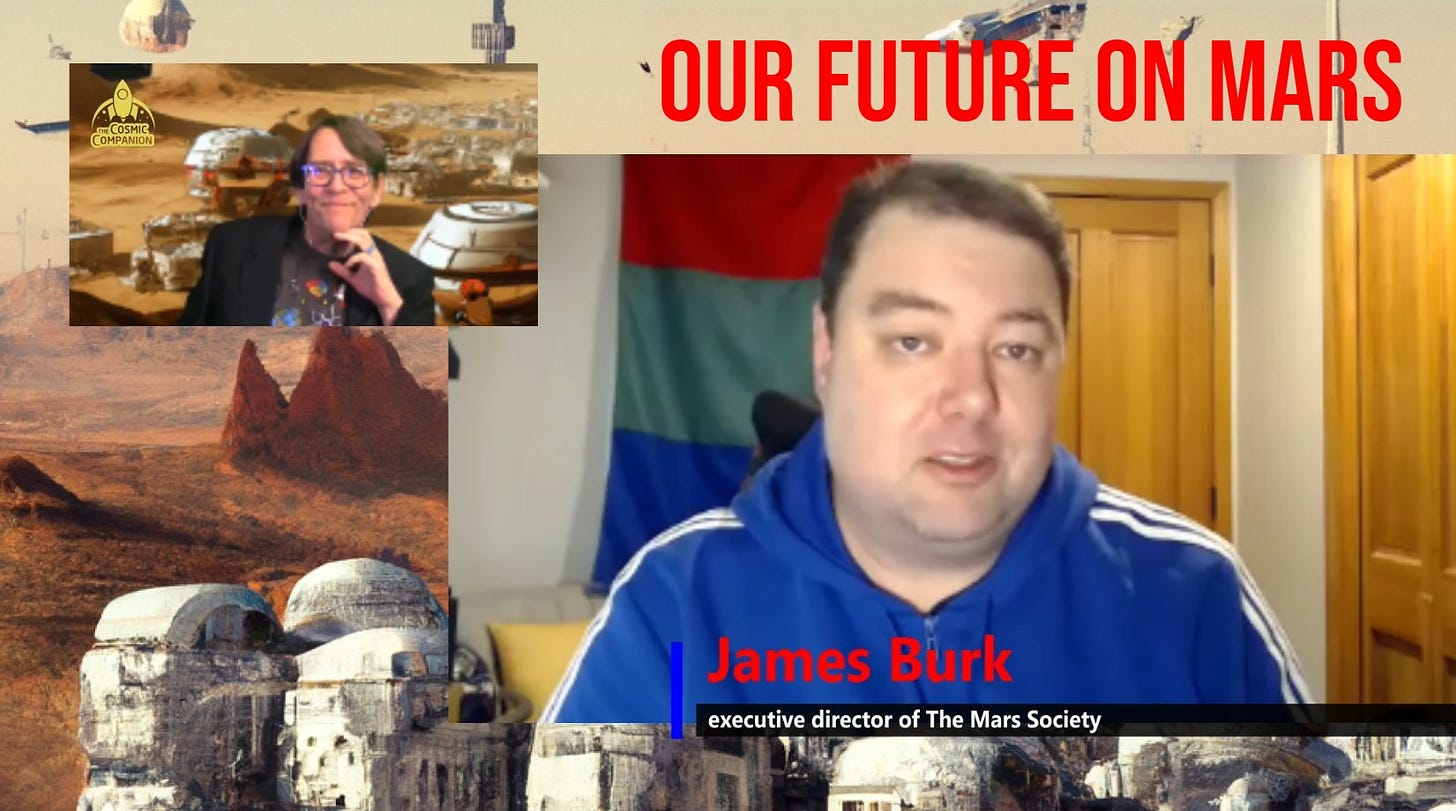We look at the future of living on Mars, talking with James Burk, executive director of The Mars Society
This week on The Cosmic Companion, we look at our shared future, living on the surface of the Red Planet. Later in the show, we’ll be talking with James Burk, executive director of The Mars Society.
Science-fiction has fueled the human quest to live on Mars for generations, from the technically-adept-if-illness-prone aliens of H.G. Wells’ “The War of the Worlds,” onward to Ray Bradbury’s “The Martian Chronicles,” and through Red Mars from Kim Stanley Robinson.
[Oh… They told me “It’s just a cold! Don’t worry about it! Well, look at me now!”] {tsk.tsk.tsk. Poor guy. Just 412 years old.}
James Burk appears on The Cosmic Companion 4 February 2023. Creative Commons 4.0 attribution 2023 The Cosmic Companion.
Writers have long envisioned a future where humans have the technology to terraform the Red Planet, making it hospitable for life. The idea of settling our planetary neighbor is so common in science fiction that it’s nearly impossible to separate the genre from the idea of living on Mars.
In the early days of science-fiction, tales of life on Mars were often filled with adventure and danger, as humans battled hostile aliens and harsh environments.
But as our understanding of Mars has grown, so too has our vision of what living on the Red Planet might be like. These fantastic tales, filtered through the light of modern science, strip away the hostile aliens, leaving us with just the adventure, danger, and harsh environments.
[The conditions aren’t bad once you get used to it. Just jump in!] {mmm hmmm…}
Today’s writers often envision thriving Martian communities, complete with terraformed landscapes, sustainable habitats, and even interplanetary trade and commerce.
Nations, corporations, and non-governmental organizations are now investing billions of dollars in developing the technology to get humans to Mars. Many of these groups, including NASA, have plans to establish a sustainable human presence on the red planet in the coming decades.
Science fiction also popularizes the idea of living on Mars, making it more of a mainstream concept. Thanks in part to sci-fi, people now think of Mars not as a distant and uninhabitable rock, but as a world with potential for human life and exploration. This vision fuels public support for space exploration, pushing us toward the stars.
Next up on The Cosmic Companion, we talk with one of the people helping to make the Red Planet the next home for humanity, James Burk, executive Director of The Mars Society.
In the second half of the 20th century, advancements in technology and the space race between the Soviet Union and the United States fueled public interest in Mars.
The Viking missions of the 1970s marked the first-time humans successfully landed a spacecraft on the red planet, and these missions generated a wealth of data about the Martian surface and atmosphere over several years of operation.
Building on those missions, together with explorations of the Pathfinder rover, Spirit and Opportunity, Curiosity, and robotic explorers from Europe, China, India, and the UAE are opening doors to the Martian cities of the future.
One of the great challenges of bringing humans to Mars is the time needed to get there and back. A journey from Earth to Mars using chemical rockets would take around seven months. A new generation of nuclear thermal propulsion systems could reduce that time to around eight weeks. That’s like going from the gestation period of a porcupine to that of a kangaroo! Thank about it!
Our species now has a chance to start fresh, building a wide range of new societies based on modern values and beliefs. Far too many societies on Earth are still constrained by the morals and values of historical figures who did not live recently enough to have ever heard of a dinosaur, or know that meteorites fall from space.
[It’s your Uncle Ben here. No. not the rice guy. Franklin. That’s right. The stove guy. Kites, lightning rods, all that. Honestly, I probably would have loved dinosaurs. Did you know that I did some of the earliest work studying layers of oil just one molecule thick? That helped lead to the discovery of the lipid bilayer model of the biological membrane! Knowledge is power, Good day!]
On Mars, we can create small, networked communities, prioritizing sustainability, equality, and progress. And — while the existence of numerous small settlements is likely to result in a wide range of communities based on various principles, these groups will also be largely dependent upon each other for survival, connecting and uniting people across the Red Planet.
The human migration to Mars will serve as a catalyst for technological advancements. We’ll have to solve complex challenges to thrive on a new planet, from creating self-sufficient habitats to developing new forms of transportation across, and over, Martis Firmus.
[So… That’s like terra firma, but on Mars?”] {Yeah!} [Clever… Hmm…]
Finally, establishing a large population of humans on the surface of Mars offers our species our only real hope of survival in the face of planet-wide disaster. If the population of Earth were to be wiped out by a wayward asteroid, an unstable despot with visions of bringing about the end of days, or climatic disaster, our species would continue to survive on the ruddy surface of Mars. Moving out into the Cosmos offers humanity our only real hope of immortality.
That’s right — it’s the old plug your show at the end of the video trick. If you enjoyed this episode of The Cosmic Companion, please subscribe, comment, and share the episode with all of your favorite secret agents. Head on over and see every episode at TheCosmicCompanion.com or TheCosmicCompanion.net. VIP subscriptions are 25% off for educators with any .edu email address!
Next week on The Cosmic Companion, we talk about Making Space Sustainable w/ Daniel Bock from Morpheus Space. Make sure to join us starting on 11 Februrary. Martian showtimes delayed by seven minutes, 36 seconds. because, you know… the speed of light.
[It’s all relative, you know] {It’s amazing who we get on the show sometimes!}
Clear skies!
Thanks for being a subscriber!
James
Get 25% off VIP subscriptions with any .EDU email address!
























Our Future on Mars! w/ James Burk from The Mars Society